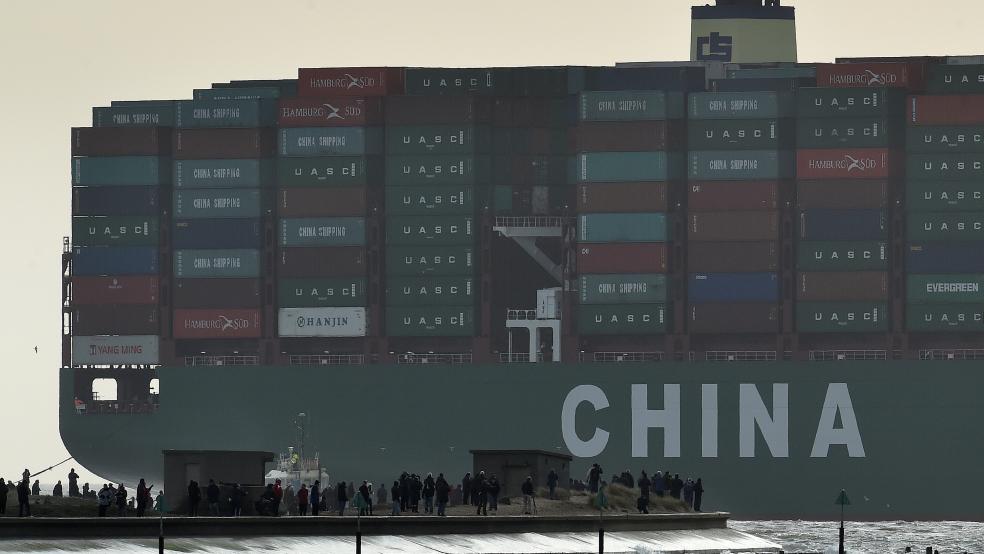Only a week away from what will probably be the most challenging meeting with a foreign leader of his presidency so far, Donald Trump has chosen an unusual way of preparing the ground. Trump will host Chinese President Xi Jinping at his Florida estate next week, for meetings that are expected to focus intensely on trade between the leaders’ two countries -- and in particular, the US trade deficit with China.
Trump, as he does, used Twitter on Thursday to send an early signal to his Chinese counterpart. “The meeting next week with China will be a very difficult one in that we can no longer have massive trade deficits and job losses,” Trump wrote. “American companies must be prepared to look at other alternatives.”
Related: Why Trump Shouldn’t Be So Worried About the Trade Deficit
On Friday, Trump was expected to sign a pair of executive orders directing his administration to undertake a pair of studies. One will look at sources of the trade deficit, with a focus on duties and fees. The other will look into whether foreign companies are “dumping” their products in the US, that is, selling them at abnormally low prices in order to gain market share or damage competitors’ profitability.
The White House has insisted that the executive orders are not focused on China, but it seems unlikely that Beijing will see things that way. Trump railed against China during his campaign, threatening punitive tariffs and promising to label the country a “currency manipulator” on Day One of his administration, the latter a promise he notably failed to keep.
He also hired economist Peter Navarro to direct the New White House National Trade Council. Navarro, whose views are well outside the mainstream when it comes to the importance of the balance of trade to the nation’s economic well-being, has made a career out of bashing China and predicting economic ruin for the US if its trade relationship with Beijing doesn’t get overhauled.
The meeting will also take place at a time when foreign governments and companies are starting to push back against Trump’s bellicose rhetoric on trade as well as on Republican leaders’ plan to consider a border-adjustable tax that would reward domestic production by placing a 20 percent tax on imported goods and raw materials while ceasing to charge US manufacturers taxes on revenues earned overseas. The tax plan, similar to the Value Added Tax (VAT) imposed by many United States’ trading partners, would effectively subsidize American manufacturing and penalize foreign companies that sell goods into the US.
Related: Will Trump Gamble on a Border Tax and Anger Millions of Walmart Shoppers?
Japanese billionaire Tadashi Yanai, whose Fast Retailing company owns the Japanese fashion outlet Uniqlo, said that he would abandon his existing US stores and his plans for a US expansion if the US began penalizing retailers who import goods for resale.
Yanai said that he recognizes that part of the desire for a border tax is to pressure companies to manufacture in America, but in an interview with a Japanese newspaper this week, he said he doesn’t like the idea of being pushed into locating his manufacturing facilities anywhere other than where he thinks it’s best for his business.
“If I was directly told to do so, I will withdraw from the United States,” he told The Asahi Shimbun. “We would not be able to make really good products [in the U.S.] at costs that are beneficial to customers. It would become meaningless to do business in the U.S.”
The administration, perhaps hoping to make an example of someone in advance of the China talks, announced Thursday that it had determined that Austria, Belgium, France, Germany, Italy, Japan, South Korea, And Taiwan are all guilty of dumping steel in the US market, and said that it would impose new tariffs on certain steel imports from those countries.
Related: Why Trump’s Next Move Against China Could Spark a Trade War
In an appearance on CNBC Friday morning, Commerce Secretary Wilbur Ross pulled no punches in defending the order. You have to think about it this way: We are in a trade war,” he said. “We have been for decades.”
The news infuriated the countries named in the report, which included several of the United States’ closest European allies. On Friday, German officials urged the European Union to bring a case before the World Trade Organization, and foreign minister Sigmar Gabriel released a statement that said, in part, “The U.S. Government is apparently prepared to provide American companies with unfair competitive advantages over European and other producers, even if such action violates international trade law...I very much fail to comprehend the decision.”
The message to China was clear: If Trump is willing to do this to his closest allies, consider how tough he’ll be on China.
For its part, China says that it doesn’t seek a trade surplus -- something its foreign affairs minister, Zheng Zeguang, reiterated this week. The reason there is a surplus/deficit relationship between the China and the US, Beijing argues, is that US consumers demand the inexpensive products that Chinese companies produce
Related: Steve Bannon Makes His Case for Economic Nationalism at CPAC
But in negotiating with the Trump administration, Beijing and the rest of the world need to remember that part of the intellectual underpinning of the Trump White House is the idea that traditional economic theories and accepted rules of thumb don’t deserve any particular deference.
That’s because in the view of White House Chief Strategist Steve Bannon, the economy is not something that exists apart from the government, and that should always be kept as free as possible from outside interference. In Bannon’s view, the economy serves the nation, not vice versa, and if sub-optimal trade policies serve another goal, then what he calls “economic nationalism” might have to win out over plain old “economics.”





